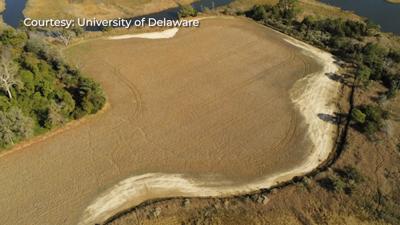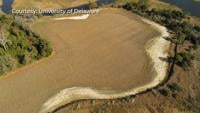DELAWARE - A recent study by the University of Delaware has revealed that saltwater is making more and more farmland on Delmarva unsuitable for crop cultivation. This phenomenon poses a significant threat to all crops, especially corn, which has a low salt tolerance.
Jay McCutcheon, co-owner of Weathered Eye Farm in Lewes, is one of the few farmers remaining east of Route One. His land is located in close proximity to the ocean, but he’s not very concerned about its potential impact on his crops. In fact, McCutcheon has implemented a proactive solution, stating, "We just added an agricultural well they dug down 135 feet, so any chance of that hitting salt water is remote."
Dr. Pinki Mondal led a study at the University of Delaware aimed at mapping out saltwater patches on Delmarva. She emphasizes that not all of these patches are clearly visible, cautioning, "you don't see the salt on those farmlands, but it is too salty, definitely too salty to make a profit."
Corn, the most widely grown crop on Delmarva, is particularly vulnerable due to its very low salt tolerance.
The Sussex Conservation District, offers guidance for those affected by saltwater intrusion, suggesting they reach out to their local USDA office for guidance.
While saltwater intrusion isn't an immediate concern for McCutcheon, he worries about the implications of sea level rise for his neighbors and their historic homes, stating, "Lewes has always been a very historic community, and people should pay attention to the fact that sea level rise is going to happen and address their historic homes accordingly."
The increased severity of coastal storms plays a role in these concerns, as they bring more seawater onto the shore.
Dr. Mondal emphasizes the interconnectedness of these issues, stating, "What we need to understand is that everything is tied. So if farm production is being impacted in coastal counties, that will affect food production and food security elsewhere."
In the short term, Dr. Mondal suggests that farmers can use substances like gypsum to mitigate the harmful effects of salt on the soil. However, in the long term, she advocates for the conversion of farmland into marshland, which has the potential to prevent the further spread of saltwater intrusion, depending on its location.







